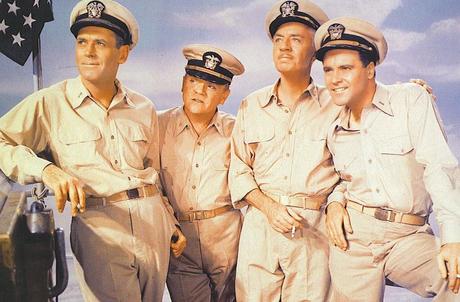 Mister Roberts (1955) seemed a slam dunk to Warner Bros.: John Ford directing Henry Fonda in a reprise of his long-running stage role. It turned into a nightmare, with director and star feuding (culminating in Ford's punching Fonda in the jaw) and Ford's health deteriorating throughout the shoot. Eventually Warners replaced Ford with Mervyn LeRoy, then Roberts's stage progenitor, Joshua Logan. Fonda told Joseph McBride "I detested that film"; audiences disagreed, making Roberts a smash hit.
Mister Roberts (1955) seemed a slam dunk to Warner Bros.: John Ford directing Henry Fonda in a reprise of his long-running stage role. It turned into a nightmare, with director and star feuding (culminating in Ford's punching Fonda in the jaw) and Ford's health deteriorating throughout the shoot. Eventually Warners replaced Ford with Mervyn LeRoy, then Roberts's stage progenitor, Joshua Logan. Fonda told Joseph McBride "I detested that film"; audiences disagreed, making Roberts a smash hit.Mister Roberts' tortured genesis shows through. It's an uneasy comedy-drama trying to recapture Logan and Thomas Heggen's stage triumph. Whether we blame Ford, his pinch hitters or studio interference, the end result's underwhelming.
Lieutenant Roberts (Henry Fonda) serves as cargo officer aboard the USS Reluctant, cruising the Pacific backwaters in World War II. Eager to see combat, his transfer requests are habitually refused by tyrannical Lt. Commander Morton (James Cagney). Roberts enlists the ship's doctor (William Powell) and goofball Ensign Pulver (Jack Lemmon) as allies in his battle of wills. As the war draws to a close, Roberts despairs of success: every act of defiance doubles Morton's resolve. That is, until Roberts targets Morton's prized palm tree.
Mister Roberts, the play, remains a perennial favorite. Heggen and Logan score depicting the banality of service life, more relatable than overblown Hollywood heroics. For every soldier or sailor fighting the front lines, there's another pulling garrison duty or patrolling obscure waterways. Thus with the Reluctant's crew, who malinger in sickbeds and carouse on shore leave. The play's mixture of bathos and poignancy holds up well; the film offers a middling approximation.
At least Ford and Co. land their protagonist. A college-educated man, Roberts earns the scorn of his low-born captain who feels him essential to running his ship. Roberts' polite disagreements turn to defiance, making him an idol to his shipmates. Roberts can't square wartime idealism with his menial posting, a familiar refrain for one caught in a crummy job. The finale, where Pulver reads a letter from Roberts, delivers a gut punch: a happy ending dissolves into tragedy.
Unfortunately, Mister Roberts suffers from flat, perfunctory direction: there's no visual evidence of Ford, with uninspired medium-range blocking even in picturesque exteriors. Worse, Roberts marginalizes the play's ribald wit (reportedly at the Navy's request) for overdone slapstick. Hence the crew's overplayed goofiness, Pulver's whimsical hijinks, the inevitable drunken revelry. Everything's punctuated by Franz Waxman's obnoxious score, whimsically grating like a sitcom soundtrack.
Henry Fonda is assured and likeable, preserving his signature role for posterity. Jack Lemmon ramps his goofball quirks to eleven, making Pulver profoundly irritating. Naturally, he won an Oscar. James Cagney acts like he's still doing a gangster flick; William Powell provides straight-necked ballast. Betsy Palmer plays a snappy WAVE. The Ford Stock Company populates the Reluctant's crew: Ward Bond, Ken Curtis, Patrick Wayne, Harry Carey Jr., Jack Pennick.
Mister Roberts is a regrettable misfire, good ideas sunk by shoddy staging. Its virtues belong to Henry Fonda and the source play, not the filmmakers.

